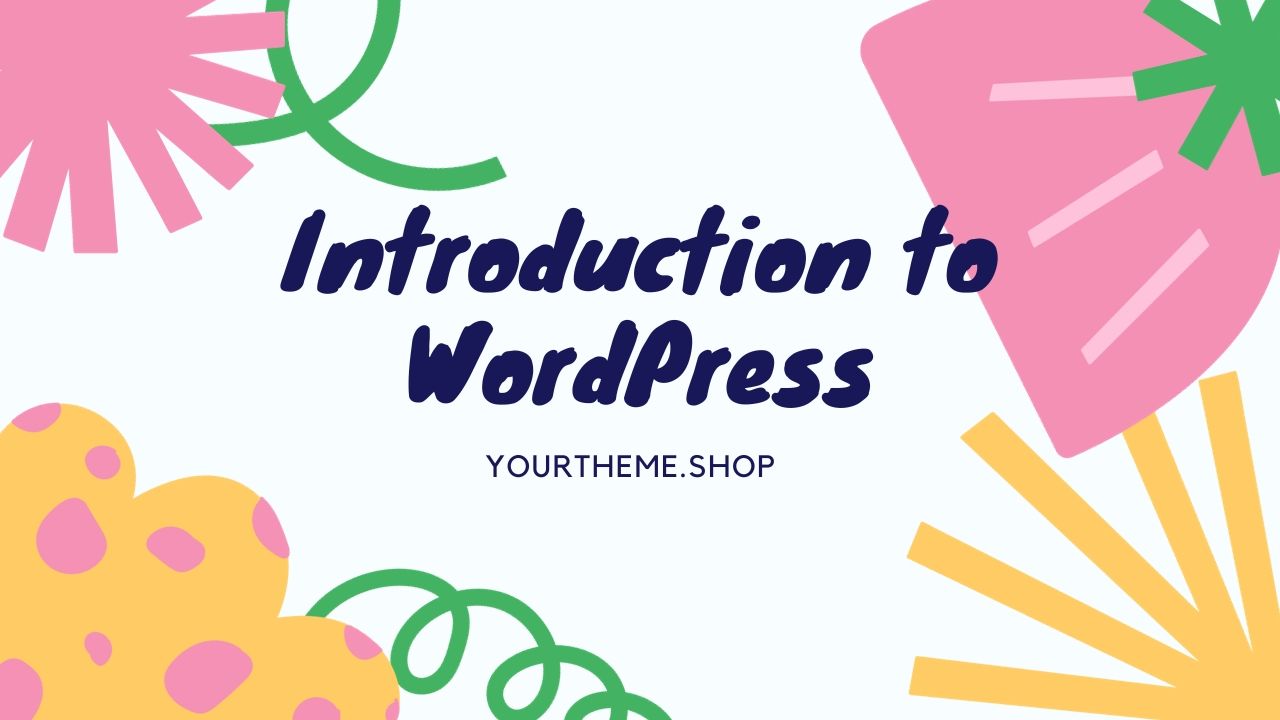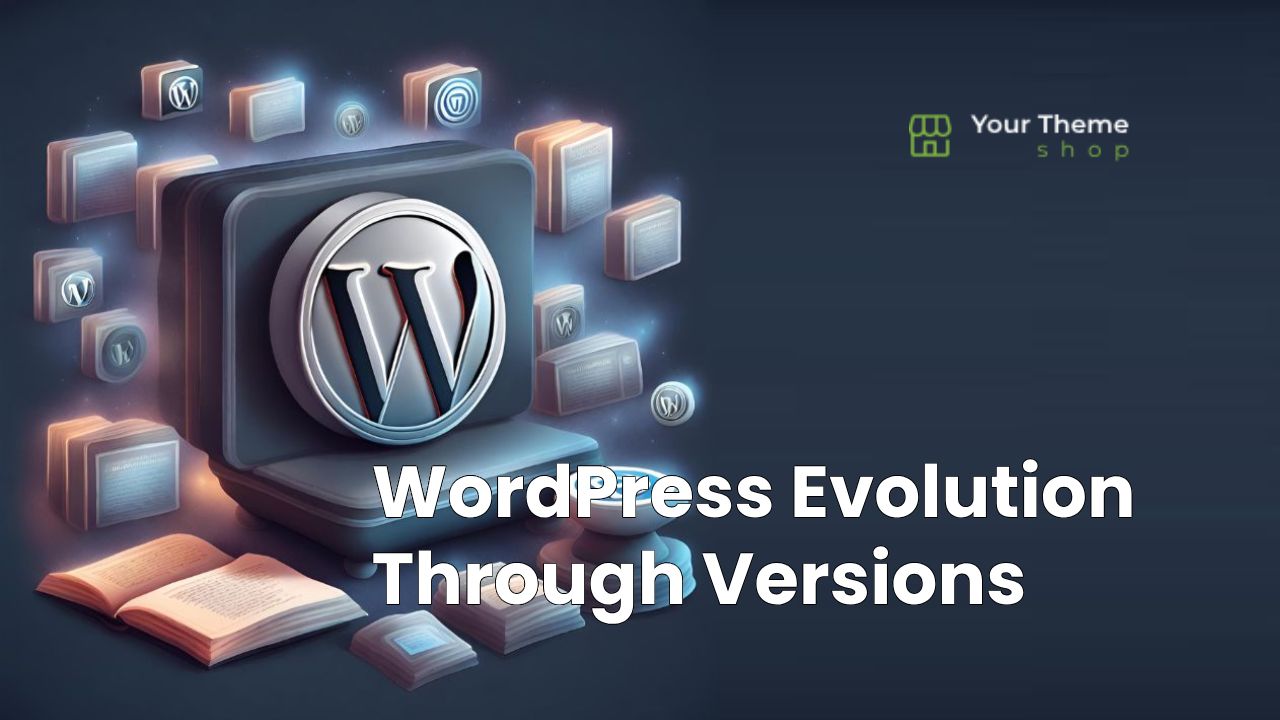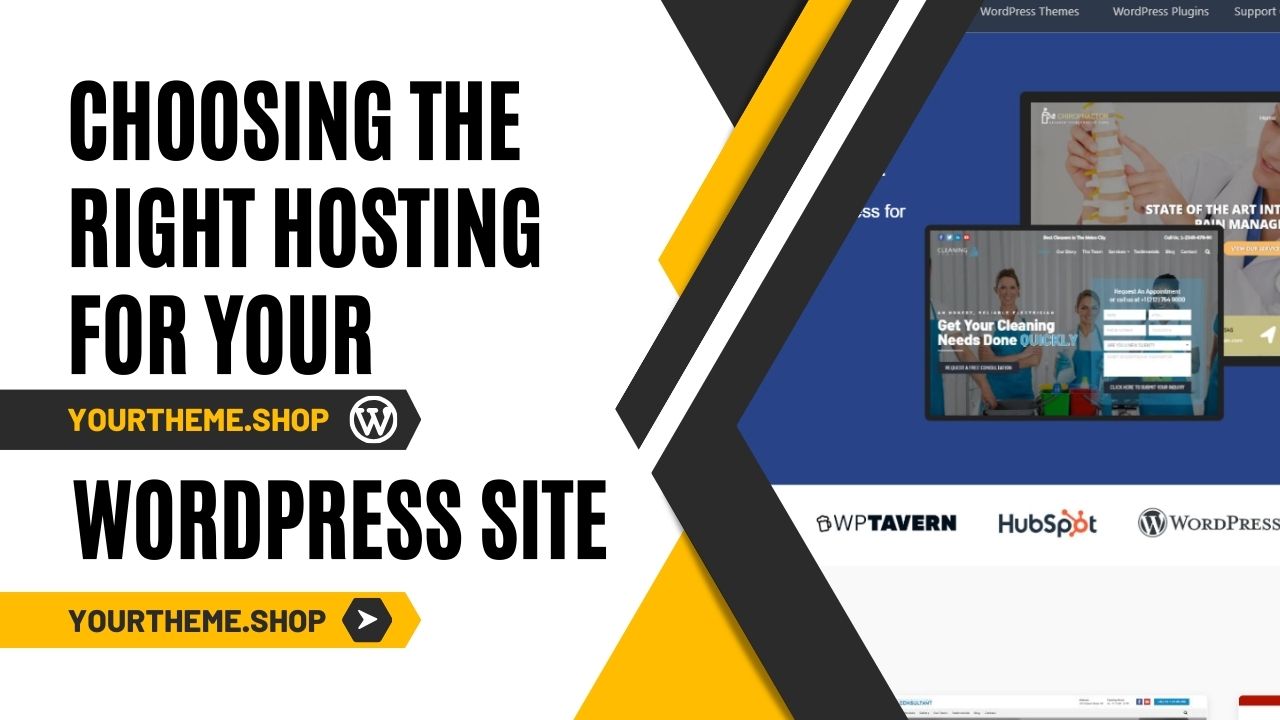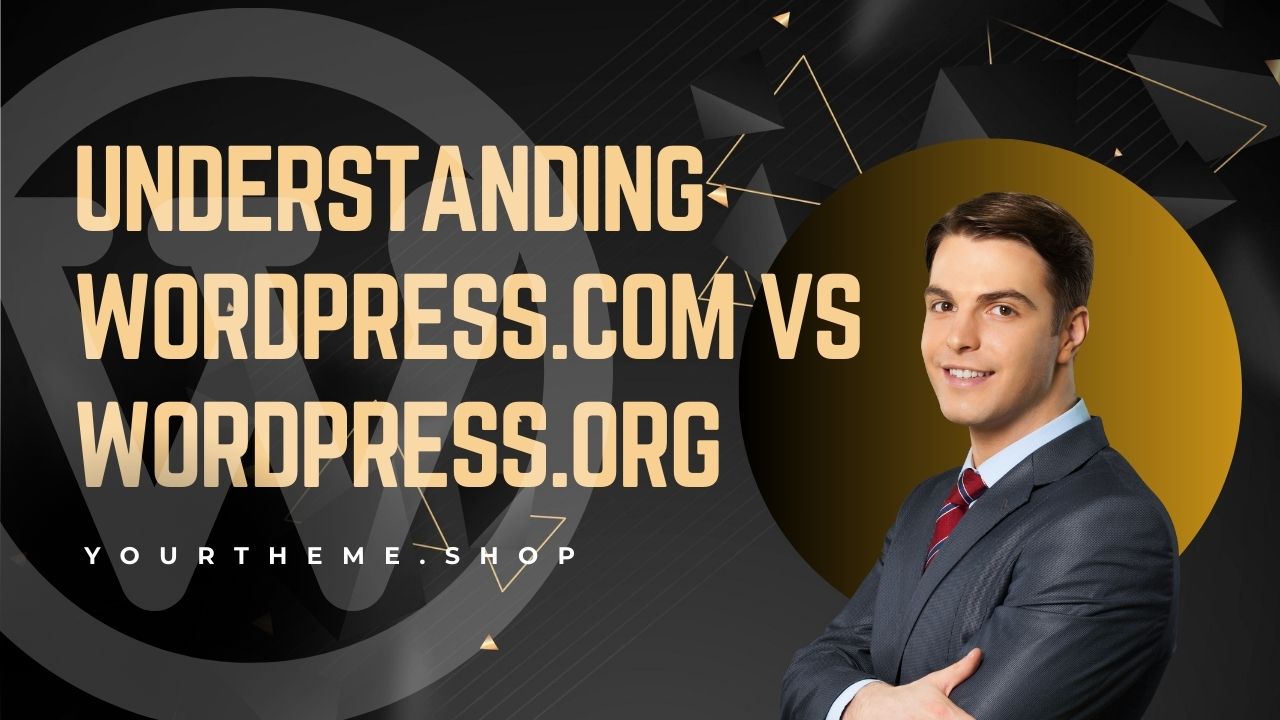Welcome to the world of WordPress, a versatile platform that powers a significant portion of the internet. This article, ‘Introduction to WordPress,’ brought to you by yourtheme.shop, aims to shed light on what ‘Introduction to WordPress’ truly is and to dispel some common misconceptions surrounding it.
What is WordPress: The Basics of Introduction to WordPress
So what is WordPress? WordPress is an open-source Content Management System (CMS), renowned for its simplicity and flexibility. Originally designed as a blogging platform, it has evolved into a comprehensive tool for building various types of websites, as discussed in this ‘Introduction to WordPress’ guide. From simple blogs to complex e-commerce sites, WordPress caters to a diverse range of web projects, making it a versatile choice for web development.
Demystifying Common WordPress Misconceptions
- Cost-Effectiveness: Many believe WordPress is entirely free. While the core software is free, running a website incurs costs such as hosting, domain registration, and potential investments in premium themes or plugins.
- Ease of Use: WordPress is user-friendly, but mastering its full potential requires learning. Its ease of use attracts beginners, yet it possesses powerful features that cater to advanced users and developers.
- WordPress.com vs. WordPress.org: A common confusion arises between WordPress.com (a hosted service) and WordPress.org (a self-hosted platform). Though they share a name and have some overlap, they serve different needs and audiences.
A Brief History of WordPress: Major Milestones and Version Releases
The history of WordPress is a remarkable journey that began in 2003 when its co-founders, Matt Mullenweg and Mike Little, embarked on a mission to create a user-friendly and robust platform for web publishing. This history, which we delve into in this ‘Introduction to WordPress’ guide, traces its origins back to a fork of b2/cafelog, driven by the ambition to enhance the typography of everyday writing.
Evolution Through Versions
WordPress has seen significant growth and improvements with each version release, as we discuss in this ‘Introduction to WordPress’ guide. Notable milestones include:
- WordPress 1.0 (2004): This release laid the foundation, introducing the admin interface and main features.
- WordPress 3.0 (2010): A major leap, introducing custom menus, new APIs, and merging with WordPress MU (Multi-User), allowing the creation of a network of sites.
- WordPress 5.0 (2018): Marked the introduction of the Gutenberg Block Editor, revolutionizing content creation by replacing the classic editor with a block-based editor.
- WordPress 6 (2023): The latest version of WordPress, WordPress 6, continues the platform’s tradition of innovation and enhancement. It brings forth cutting-edge features and optimizations, further cementing WordPress’s position as a top-tier content management system.
The Impact of Open Source
Being an open-source project, WordPress thrived on community contributions, as highlighted in this ‘Introduction to WordPress’ guide. This collaborative approach fueled its evolution, making it a flexible and powerful platform capable of handling various types of websites.
The Benefits of Using WordPress: Flexibility, Security, and Community Support
Unmatched Flexibility
WordPress’s greatest strength lies in its flexibility. It allows users to create a wide variety of websites, from simple blogs to complex e-commerce platforms. This adaptability is powered by an extensive range of themes and plugins, enabling customization to meet specific needs.
Robust Security
Security is a paramount concern in the digital space, and WordPress consistently addresses this with regular updates and patches. The open-source nature of WordPress means a vast community of developers continuously works to identify and fix vulnerabilities, making it a secure choice for website creation.
Vibrant Community Support
The WordPress community is one of its most valuable assets. It’s a global network of users, developers, and enthusiasts who offer support, share knowledge, and contribute to the platform’s growth. This community-driven approach results in a wealth of resources like forums, tutorials, and meetups, providing invaluable assistance for WordPress users of all skill levels.
Addressing Misconceptions about WordPress
While ‘Introduction to WordPress’ is widely used and acclaimed, there are several misconceptions that often cloud its true capabilities and features, as we’ll explore in this section. Let’s debunk some of these common myths:
- WordPress is Just for Blogs: Originally a blogging platform, WordPress has evolved into a robust CMS capable of building a variety of websites, including e-commerce, portfolios, and more.
- WordPress Isn’t Secure: Security concerns are often raised with WordPress. However, with regular updates and a vigilant community, WordPress is as secure as any other leading platform. It’s the responsibility of website owners to implement best practices for optimal security.
- WordPress Sites Are Slow: Website speed largely depends on hosting, themes, plugins, and content. WordPress itself can be incredibly fast when optimized correctly.
- Customization Requires Coding Skills: While coding can enhance customization, WordPress offers numerous themes and plugins allowing users to build and customize sites without any coding knowledge.
- WordPress Is Not for Large Sites: Contrary to this belief, many high-traffic and large-scale websites run on WordPress, showcasing its scalability and robustness.
WordPress Compared to Other Website Builder Platforms: Differences and Unique Advantages
Differentiating WordPress
WordPress stands out in the landscape of website builders for several reasons:
- Open-Source Freedom: Unlike proprietary platforms, WordPress offers unparalleled freedom for customization and development. This open-source nature fosters a rich ecosystem of themes and plugins.
- Community vs. Company-Driven Development: WordPress benefits from a global community of contributors, as opposed to being solely developed by a single company. This results in diverse input and rapid innovation.
- Flexibility for All Skill Levels: From beginners to advanced developers, WordPress caters to a broad spectrum of users. Other platforms may target specific skill levels, but WordPress’s versatility makes it suitable for a wide range of projects and users.
WordPress vs. Others
When compared to other platforms like Wix, Squarespace, or Shopify, WordPress offers a unique blend of flexibility and control. It excels in areas like SEO capabilities, customization options, and the ability to migrate your site to different hosts, which can be limitations in some other platforms.
WordPress in Practice: Real-World Applications and Case Studies
Versatility Across Various Industries
WordPress is not just for blogs or small business websites; it’s a robust platform used across multiple industries. From news sites to e-commerce, and educational platforms to non-profits, WordPress’s flexibility allows it to adapt to diverse needs.
Case Studies Showcasing Success
- E-Commerce Success: Many online stores have been built on WordPress, utilizing WooCommerce for powerful and flexible e-commerce capabilities.
- Educational Platforms: Schools and universities often turn to WordPress for its ease of content management and customization, creating informative and interactive educational websites.
- Non-Profit Organizations: With WordPress, non-profits find an affordable solution to create a strong online presence, enabling them to focus on their mission rather than on technical complexities.
WordPress: A Catalyst for Economic Growth and Job Creation
Market Valuation and Revenue Growth:
- Significant Market Valuation: In 2021, WordPress’ market valuation soared to $636 billion, a substantial increase from $596.7 billion in the previous year, marking its growing dominance in the web development arena. [1]
- Rising Revenue Trends: WordPress witnessed a steep revenue growth, reaching approximately $1.3 billion in 2021, up from $1 billion in 2020, indicative of its expanding market reach and popularity. [1]
Employment Impact and Job Market Dynamics:
- Global Employment by Automattic: Automattic Inc., the parent entity of WordPress, plays a significant role in global employment, with over 2,000 employees as of 2022, showcasing WordPress’s direct contribution to job creation. [1]
- Increasing Job Opportunities: The demand for WordPress-related roles has seen a consistent uptick. Predominant roles include WordPress Developers, Designers, Content Creators, Project Managers, and Support Specialists, each contributing to a vibrant and dynamic job market. [2]
- Salary Trends in WordPress Jobs: Notably, WordPress Developers form 65% of the job market, with an average annual salary of $77,000 in the U.S. This is followed by roles like Designers, Content Creators, Project Managers, and Support Specialists, each with a distinct salary range and market presence, underlining the diverse career opportunities within the WordPress ecosystem. [2]
Industry-Wide Adoption and Impact:
- Tech Industry Adoption: The tech industry anticipates a 15% rise in WordPress usage by 2024, leveraging its flexibility and user-friendliness for enhanced online presence. [3]
- Healthcare Sector’s Digital Transformation: WordPress is increasingly utilized in the healthcare sector for patient portals and digital outreach, illustrating its adaptability to sector-specific needs. [3]
- Educational Sector’s Engagement: Over 75% of educational institutions reported improved engagement with students through WordPress-based platforms, highlighting its impact on digital learning. [3]
- Entertainment and Non-Profit Sectors: The entertainment industry is set to witness significant adoption of WordPress, while non-profit organizations favor WordPress for its cost-effectiveness, further emphasizing its wide-ranging industry applicability. [3]
The widespread adoption of WordPress has spurred significant employment opportunities in the digital landscape, as we explore in this ‘Introduction to WordPress’ guide. It has created a thriving ecosystem of web developers, designers, content creators, and digital marketing professionals, contributing to its role as a significant employment driver in the global web development landscape.
Freelancers and agencies specializing in WordPress development offer services like website creation, theme and plugin development, and ongoing site maintenance, while the vast array of WordPress themes and plugins have opened up avenues for entrepreneurs and developers to create and sell their products. WordPress-related jobs, from technical support to training and education, further emphasize its role in job creation and economic growth.
Information Source:
- https://www.usesignhouse.com/blog/wordpress-market-stats
- https://digitalacce.com/wordpress-jobs-stats-analyzing-job-demand-and-average-salaries/
- https://acclaim.agency/blog/wordpress-statistics-by-industry-for-2023
Future and Evolution of WordPress: Looking Ahead
Continuous Innovation
The future of WordPress is shaped by continuous innovation and adaptation to emerging web technologies. The platform’s commitment to staying relevant and forward-thinking ensures it will remain a leading choice for website creation.
Anticipating Trends
WordPress is expected to embrace advancements like artificial intelligence, enhanced block editor functionalities, and more integrated e-commerce solutions. These developments aim to make the platform even more user-friendly and powerful.
Community-Driven Growth
The vibrant WordPress community continues to be a driving force behind its evolution. As user needs evolve, so will WordPress, adapting to new trends and technologies.
WordPress stands out as a versatile, secure, and user-friendly platform suitable for a wide range of web projects. From dispelling common misconceptions to highlighting its robust features and comparing it with other platforms in this ‘Introduction to WordPress’ guide, we’ve explored the numerous reasons why WordPress is a top choice for web developers and content creators. As WordPress continues to evolve, it remains a reliable and dynamic tool for building and managing websites of all sizes and types.
Embrace WordPress for your digital journey, and join the millions who have found success and satisfaction in its extensive capabilities.





